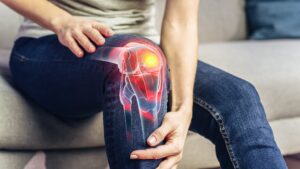February 7, 2024
Have you ever heard someone predict the weather through an achy knee or shoulder? It’s true: some people can feel the weather ‘in their bones.’ Many people with arthritis experience more severe pain when it rains or snows. The winter season can be particularly difficult.
Knowing the facts about arthritis can help. If chilly weather worsens your arthritis, there are ways to cope. Healthcare Associates of Texas can provide a personalized arthritis evaluation and expert guidance.
What causes arthritis?
Arthritis develops when tissue within the joints becomes inflamed.1 Many diseases and conditions can trigger arthritis, and symptoms can vary. Some may experience mild discomfort or stiffness, but pain can be severe for others. If you have severe arthritis, you may have trouble standing, walking, or performing daily activities. Even mild symptoms can impact your quality of life.
 Am I at risk for arthritis?
Am I at risk for arthritis?
Arthritis usually occurs in older adults due to joint wear and tear.2 You might also develop swollen, achy joints as you age after an orthopedic injury. People with a history of sports injuries may be at a higher risk of developing arthritis. But rest assured that cracking your knuckles doesn’t cause arthritis.
Women are more likely to develop most forms of arthritis. Some types of arthritis can also run in families. If your parents or grandparents had arthritis, you’re more likely to develop it, too.
Being overweight is another risk factor. Carrying extra weight adds stress to the joints in your hips, back, and legs.3 Losing excess weight may help reduce your risk of arthritis or improve existing symptoms.
Unfortunately, arthritis is usually a progressive disorder. That means symptoms typically get worse over time. But you can slow arthritis progression by adopting a healthy lifestyle. Preventive measures can help, too. For many people, arthritis is worse during the winter.4 Taking extra care of your joints during cold weather can ease seasonal pain and stiffness.
Does the cold weather make arthritis worse?
If you have arthritis, you’ve probably noticed your symptoms worsen in the winter. It’s not your imagination: cold weather can aggravate arthritis.4 But winter weather doesn’t cause arthritis. There’s no evidence that cold weather speeds up joint damage, either. Nevertheless, your pain sensitivity may increase as the temperature drops.5 That’s because changes in temperature and humidity can affect joint function in several ways.
 Why does cold weather make arthritis worse?
Why does cold weather make arthritis worse?
A healthy body circulates warm, oxygen-rich to joints and tissues. But the cold can slow down circulation. Winter weather can also cause tissues to stiffen or swell, worsening joint pain.
You might notice your symptoms worsening after a rapid temperature change. Doctors aren’t sure why this happens. Sudden changes in barometric pressure may add stress to joints. Rapid shifts in temperature or humidity might also cause tissues to swell. If you have preexisting joint problems, increased swelling puts pressure on sensitive tissues. Inclement weather can also make it more difficult to stay active. A sedentary lifestyle could make you feel achier and depressed.6
Does everyone with arthritis experience worsening symptoms in winter?
Keep in mind that the term ‘arthritis’ describes a set of symptoms. Arthritis is linked to several different diseases, and each one can present differently.4 Your arthritis might be strongly affected by the weather, but your friend might not experience any seasonal changes. Symptoms can vary. Different people may experience different degrees of discomfort. Symptom severity often depends on the cause of your arthritis, age, and lifestyle factors.
Fortunately, most arthritis is treatable. Medication and at-home treatments can dramatically reduce joint pain and swelling.7
What can I do to ease arthritis pain?
Stay warm
Keeping warm is the best way to ward off joint pain. In the winter, dress in light, breathable layers. Layering your clothing helps trap body heat against the skin. Try a hot water bottle, electric blanket, or warm bath. Many people with arthritis report that baths help ease their discomfort. A bath with Epsom salts can relax stiff tissues and ease joint pressure.
 Keep moving
Keep moving
Exercise plays a key role in controlling arthritis symptoms.7 Regular exercise boosts circulation and keeps joints flexible. It can also increase serotonin and endorphin production, which may help to relieve pain8. If you suffer from joint discomfort, low-impact exercise is best. Consider yoga, swimming, or bicycling.
Eat healthy
You already know the importance of a well-balanced diet. But you may not know that some foods are vital to bone and joint health. Vitamin D and calcium are essential nutrients for older adults. Magnesium and fish oil can help promote joint health, too.7 Add more eggs, fish, dairy, and legumes to your diet. You might also want to add a multivitamin to your daily wellness routine.
Watch the scale
Talk to your doctor about safe and effective weight-loss strategies if you’re overweight. Losing weight can ease joint pain and pressure and improve cardiovascular function.3
Avoid falls
Stiff joints may not respond quickly to changes in terrain. As a result, people with arthritis are at a high risk for falls. Falling can worsen joint damage or trigger arthritis in other joints. In older adults, falls are also linked to serious health problems.
A fall may result in a bone fracture and a lengthy recovery period. Bedridden patients may experience complications like pneumonia or blood clots. For some, a simple fall may turn into life-threatening complications.9 You can reduce your risk of falling by wearing well-fitting, nonskid shoes.
When should I see a doctor for arthritis pain?
Many people believe that arthritis is an unavoidable part of aging, but this is a myth. Researchers aren’t sure why some people develop arthritis while others don’t. However, researchers do know that the causes of joint pain can vary. Sometimes, joint pain or stiffness can be an early warning sign of a more severe condition.4 Always consult your doctor about new or worsening joint pain. Your doctor can run tests to find the root cause of your symptoms.
If you have arthritis, medications or physical therapy can help. Your doctor can help you review your treatment options. At Healthcare Associates of Texas, we offer a variety of primary care services, including arthritis management. Request an appointment today, and take the first step on the road to healthier joints.
References:
- “Arthritis: Symptoms & Causes.” Mayo Clinic, August 29, 2023. https://www.mayoclinic.org/diseases-conditions/arthritis/symptoms-causes/syc-20350772.
- “Osteoarthritis (OA).” Centers for Disease Control and Prevention, July 27, 2020. https://www.cdc.gov/arthritis/basics/osteoarthritis.htm.
- “Osteoarthritis.” MedlinePlus, February 23, 2022. https://medlineplus.gov/osteoarthritis.html.
- “Arthritis.” Cleveland Clinic, November 13, 2023. https://my.clevelandclinic.org/health/diseases/12061-arthritis.
- Fernandes, Elizabeth S., Fiona A. Russell, Khadija M. Alawi, Claire Sand, Lihuan Liang, Robin Salamon, Jennifer V. Bodkin, et al. “Environmental Cold Exposure Increases Blood Flow and Affects Pain Sensitivity in the Knee Joints of CFA-Induced Arthritic Mice in a TRPA1-Dependent Manner.” Arthritis Research & Therapy 18, no. 1 (2016). https://doi.org/10.1186/s13075-015-0905-x.
- “Best Climate for Arthritis Patients: Humidity’s Impact on Your Joints.” Arthritis Foundation. Accessed December 18, 2023. https://www.arthritis.org/health-wellness/healthy-living/managing-pain/understanding-pain/best-climate-for-arthritis.
- “Arthritis: Diagnosis & Treatment.” Mayo Clinic, August 29, 2023. https://www.mayoclinic.org/diseases-conditions/arthritis/diagnosis-treatment/drc-20350777.
- Lin, Tzu-Wei, and Yu-Min Kuo. “Exercise Benefits Brain Function: The Monoamine Connection.” Brain Sciences 3, no. 4 (2013): 39–53. https://doi.org/10.3390/brainsci3010039.
- Falls in older persons: Risk factors and prevention. Accessed December 18, 2023. https://www.ncbi.nlm.nih.gov/books/NBK235613/.
DISCLAIMER
The information featured in this site is general in nature. The site provides health information designed to complement your personal health management. It does not provide medical advice or health services and is not meant to replace professional advice or imply coverage of specific clinical services or products. The inclusion of links to other web sites does not imply any endorsement of the material on such websites.